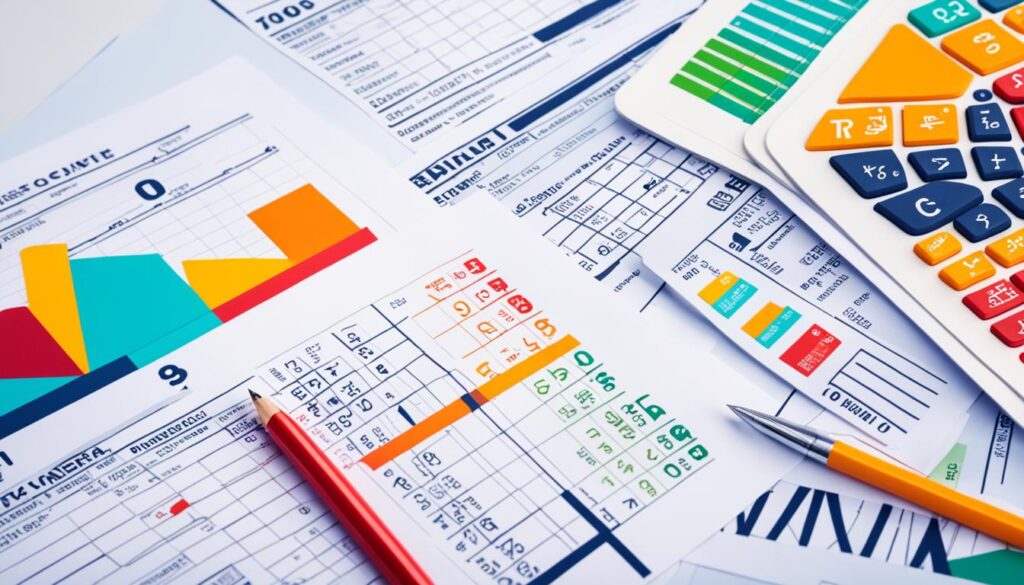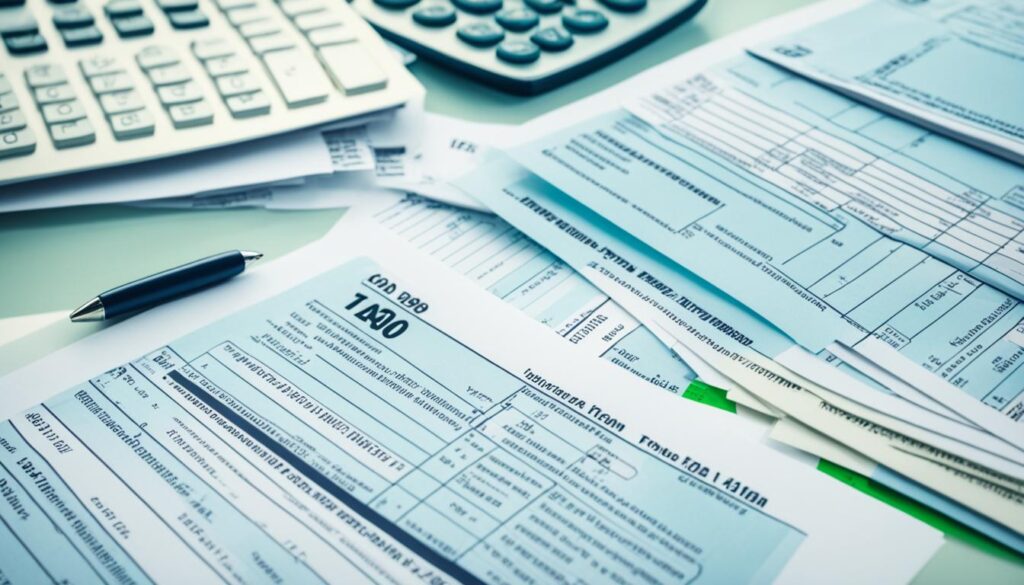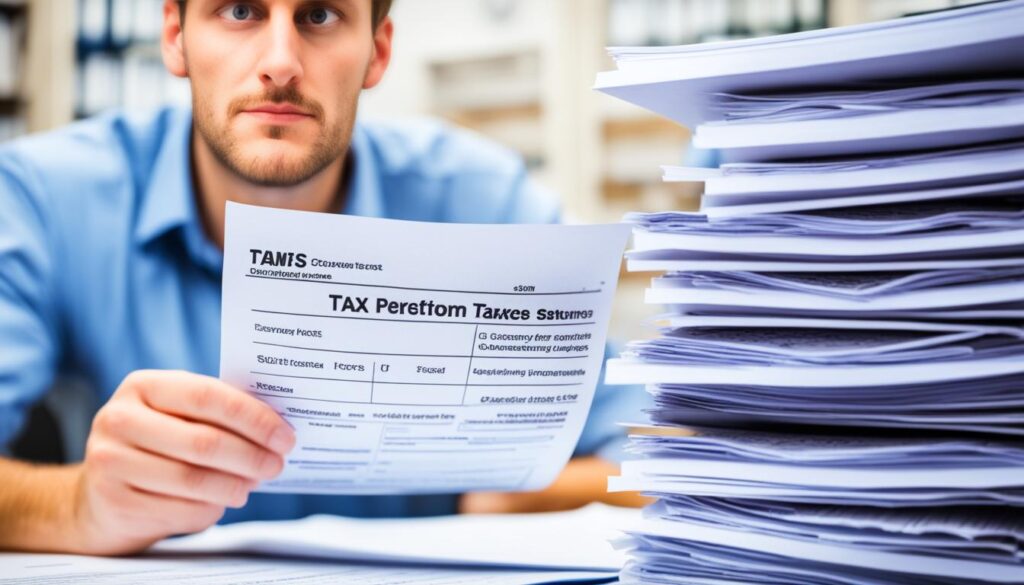Understanding business taxes is key to your success and financial health. But, it’s tough with all the regulations, deductions, and deadlines. Navigating business taxes can feel like being in a dense jungle.
This guide is made to help you with filing business taxes, maximizing tax deductions, and planning for tax liabilities. It’s useful for both seasoned entrepreneurs and those new to business. Let’s make the complex world of business taxes simple for you.
Now, let’s get started! We’ll share tips, strategies, and must-knows. These will help you manage your business taxes like a pro.

Key Takeaways:
- Understand the essential IRS business tax requirements and corporate tax laws.
- Discover tax planning strategies to minimize your tax liability.
- Learn about available tax deductions for businesses that can reduce your taxable income.
- Explore tax credits that your business may be eligible for.
- Find out how a tax consultant can help you navigate the complexities of business taxes.
What is an Employer Identification Number (EIN)?
An Employer Identification Number (EIN) acts as your business’s federal tax ID. It’s a unique nine-digit number. It’s provided by the Internal Revenue Service (IRS) to identify your business for taxes.
Most businesses need an EIN to do their taxes. But, not every business must have one. The IRS checks certain things to see if your business needs an EIN. These include:
- Hiring employees
- Operating as a partnership or corporation
- Opening a business bank account
- Filing specific tax returns
If your business does any of these, you should get an EIN. This makes sure you follow IRS rules.
Getting an EIN is easy and you can do it online. Just visit the official IRS site. There, the IRS gives you help and an online form to fill out.
An EIN helps with your taxes. It keeps your personal and business taxes separate. This lets you handle your federal taxes right.
Keep your EIN safe and use it only for your business. If you have questions about your EIN or taxes, ask a small business tax expert for help.
Types of Business Taxes
Understanding various taxes is vital when running a business. We’ll look at income, estimated, self-employment, employment, and excise taxes here.
Income Taxes
Income taxes are essential for businesses. They apply to profits and earnings. The amount you pay depends on your net income after expenses.
Estimated Taxes
Business owners might need to pay estimated taxes. These are paid quarterly. They help ensure you meet tax obligations throughout the year.
Self-Employment Taxes
Self-employment taxes are for people working for themselves. This includes freelancers and contractors. These taxes contribute to Social Security and Medicare.
Employment Taxes
Businesses with employees need to handle employment taxes. These include Social Security, Medicare, federal, and sometimes state and local taxes. They’re withheld from employee wages.
Excise Taxes
Excise taxes apply to certain goods or services. This includes items like alcohol, tobacco, and gasoline. The price usually includes these taxes, collected by businesses.
Getting familiar with different business taxes helps in planning and compliance. Each type has specific requirements. Always consult a tax professional or use tax software for accuracy.

The Employee Retention Credit
The IRS introduced the Employee Retention Credit (ERC) in response to COVID-19. This refundable tax credit helps businesses keep their workers during these hard times. Known as the Employee Retention Tax Credit (ERTC), it has been vital for many.
Businesses might get **$5,000** per worker for 2020 and **up to $7,000** per worker per quarter in 2021. The credit covers a part of wages and healthcare for eligible employees. Both large and small businesses can apply, if they meet certain criteria.
The IRS made a checklist to see if businesses can get the ERC. It looks at things like big drops in sales or mandatory closures. This helps companies know if they can apply.
Applications for the ERC go to the IRS. But, they’ve stopped processing them for now because there are too many. They still take applications, but it might take longer to process.

The ERC is still key for keeping workers during these tough times, despite the pause. It lets businesses lower their taxes and spend more on their teams.
ERC Application Deadlines
Meeting ERC deadlines is key to get the most benefit. Deadlines vary by year and quarter. Here’s the latest deadline info:
| Year | Quarter | Application Deadline |
|---|---|---|
| 2020 | Q2 | June 30, 2021 |
| 2021 | Q1 | July 31, 2021 |
| 2021 | Q2 | September 30, 2021 |
| 2021 | Q3 | Not Yet Announced |
| 2021 | Q4 | Not Yet Announced |
It’s important to track the deadlines and apply on time. Since dates can change, check the IRS site often.
Even with delays, the ERC helps businesses a lot. Talk to a tax expert to make sure you apply right and get the most from it.
Filing Tax Forms
Filing the correct tax forms is key in business. It ensures you follow the rules and avoid fines. Knowing which forms to use and their details is key for right tax filing. We will talk about the main tax forms for business owners.
Self-employed people often use Schedule C. It’s for reporting income or loss from a solo business. It helps you list your business costs and figure out your profit or loss.
For partnerships or limited liability companies (LLCs), you’ll need Form 1065. It reports the business’s income, costs, gains, losses, and credits.
Corporations file with Form 1120 to show income, deductions, and credits. This form is mainly for C-corporations.
If your LLC opts to be taxed as an S-corporation, use Form 1120S. It’s the right form for this choice.
“Filing the right tax forms is key for correct reporting and following rules. It’s important to know which forms fit your business to meet all tax needs.”
If picking tax forms or fill them out seems hard, ask a certified public accountant (CPA) or tax pro for help. They know lots about tax filing and can help you do it right, following the IRS’s rules.
Common Business Tax Forms
| Tax Form | Purpose |
|---|---|
| Schedule C | Report income or loss from a sole proprietorship |
| Form 1065 | Report income, deductions, gains, losses, and credits for partnerships and LLCs |
| Form 1120 | Report income, deductions, and credits for C-corporations |
| Form 1120S | Report income, deductions, and credits for S-corporations |

Deadlines, Extensions, and Past Due
It’s vital to meet your business tax deadlines to prevent penalties and extra taxes. Here are key dates for business tax you should remember this year:
- Quarterly Estimated Tax Payments: April 15, June 15, September 15, and January 15 of the following year.
- Information Statement Filings: February 28 (or March 31 if filing electronically) for Form 1099-MISC, February 28 for Form 1099-K, W-2G, and certain 1098 forms.
- W-2 Distribution: January 31.
- Federal Unemployment Tax (FUTA): January 31.
- S Corporation Election: March 15.
If you need more time for your tax return, consider a tax extension. However, this extension does not delay your payment due date. You should estimate and pay owed taxes by the initial deadline to dodge penalties and interest.
Filing taxes late can lead to penalties and interest. These penalties change with the tax amount due and how late the filing is. Also, interest grows on any unpaid tax from the due date until it is paid off.
Knowing the exact deadlines for your business is key to avoiding penalties. It’s wise to seek professional advice when needed. Make sure to understand and meet all tax filing deadlines.
Keeping organized and informed about tax obligations reduces stress and improves your business’s finance health.

Business Taxes Around the World
When you’re doing business around the globe, knowing about international business taxes is vital. Every country has its own set of tax rules, which can affect your business’s money matters a lot.
Tax treaties are key to smooth international trading. They help avoid double taxing and assist in smart tax planning. These agreements between countries set rules on taxing business profits in cross-border dealings.
For instance, the USA has tax treaties with many countries, like the UK, Canada, Germany, and Japan. These treaties stop double taxation. They also guide on things like company presence, tax withholding, and sharing tax info.
“Tax treaties serve as a critical framework for businesses to navigate international tax obligations and ensure compliance with foreign tax laws. They provide clarity and predictability, helping businesses plan and allocate resources effectively.”
Being smart with tax planning is crucial when your business crosses borders. This means studying each country’s tax rules and taking advantage of any tax breaks. Your goal? Lower your taxes but stay within the law.
Getting advice from tax pros can make a big difference. They know the ins and outs and can keep your business right with the law. They also know ways to cut your tax bill and spot any upcoming problems.
Understanding and using tax treaties can really help manage worldwide taxes. This way, you can tune your tax strategy for the best results.
Tax Planning Considerations for International Business
Keep these points in mind for international business taxes:
- Think about the tax effects of growing your business abroad.
- Learn about tax residency rules in each country.
- Know the rules for pricing between your own companies.
- Keep up with changes in international tax laws.
- Understand how value-added taxes (VAT) or goods and services taxes (GST) work in each place.
International tax planning needs careful thought and knowing your business well. Talking to international tax experts can help create a strong tax plan that fits your goals.
| Country | Tax Rate | Corporate Tax Incentives | Tax Treaty Status |
|---|---|---|---|
| United States | 21% | R&D tax credits, accelerated depreciation | Active tax treaties with numerous countries |
| United Kingdom | 19% | Entrepreneur’s relief, creative industry tax credits | Extensive tax treaty network |
| Canada | 26.5% | Scientific research and experimental development (SR&ED) tax credits | Wide range of tax treaties |
| Germany | 29.875% | Machinery and equipment investment tax incentives | Extensive network of tax treaties |
Note: The details in the table are just a glimpse. Tax rates, incentives, and treaty situations can change. Always check with tax experts and look at official sources for the latest info.

Strategies to Reduce Business Tax Liability
Finding ways to lower your business taxes is key to keeping more money in your pocket. You can save on taxes by using deductions, credits, and special accounts. Planning your taxes well and getting expert advice can make a big difference. Let’s look at some steps to cut your business tax bill.
1. Take Advantage of Tax Deductions
Tax deductions help you pay less tax by lowering your income. Businesses can write off costs like:
- Business expenses: This includes rent, utilities, supplies, and wages.
- Depreciation: You can deduct the cost of your business assets over time.
- Healthcare costs: Money spent on employee healthcare can be written off.
Keep good records and talk to a tax expert. This way, you won’t miss any deductions and will save more.
2. Leverage Tax Credits
Tax credits are great because they directly cut down what you owe the government. Some credits businesses can get include:
- Research and development tax credit: If you spend on research, you might get this credit.
- Work Opportunity Tax Credit: This is for hiring people from certain groups.
- Energy-efficient property tax credit: If you invest in eco-friendly options, you could qualify.
Look into credits for your field and ask a tax advisor for help. This ensures you use all possible credits.
3. Utilize Tax-Advantaged Accounts
Tax-advantaged accounts offer big tax breaks. Two popular kinds are:
- Retirement plans: Saving in plans like SEP IRAs or 401(k)s reduces your taxable income. It also grows tax-free until withdrawal.
- Health Savings Accounts (HSAs): If you offer a suitable health plan, employees can save money tax-free for health costs.
Setting up these accounts benefits both your company and your staff.
4. Engage in Strategic Tax Planning
Tax planning is vital for reducing what you owe in taxes. Looking at your finances and future plans helps spot savings chances. Professionals can offer insights and make sure you follow the laws.
5. Seek Professional Tax Services
Working with professional tax services gives you access to expert advice. They know the latest rules, find deductions and credits, and improve your tax situation.
“A professional tax service saves time, lowers stress, and ensures you use every chance to save on taxes.” – Jane Smith, Certified Public Accountant
To lower your taxes, you need to plan carefully and keep up with tax rules. Using smart strategies and expert help lets you save more of your earnings.

Excise Taxes and Small Businesses
Excise taxes significantly affect small businesses. They apply to certain goods, services, or activities. Items like gasoline, alcohol, tobacco, and luxury goods often face these taxes.
For small businesses, coping with excise taxes is tough. These taxes add to costs, impacting prices and profits. To tackle this, companies can boost efficiency, seek tax incentives, and learn tax rules.
Staying up-to-date with excise tax rules at federal and state levels is vital. This way, businesses avoid fines and legal troubles. Advice from tax experts or attending workshops can guide them through excise tax complexities. This helps in making wise financial choices.